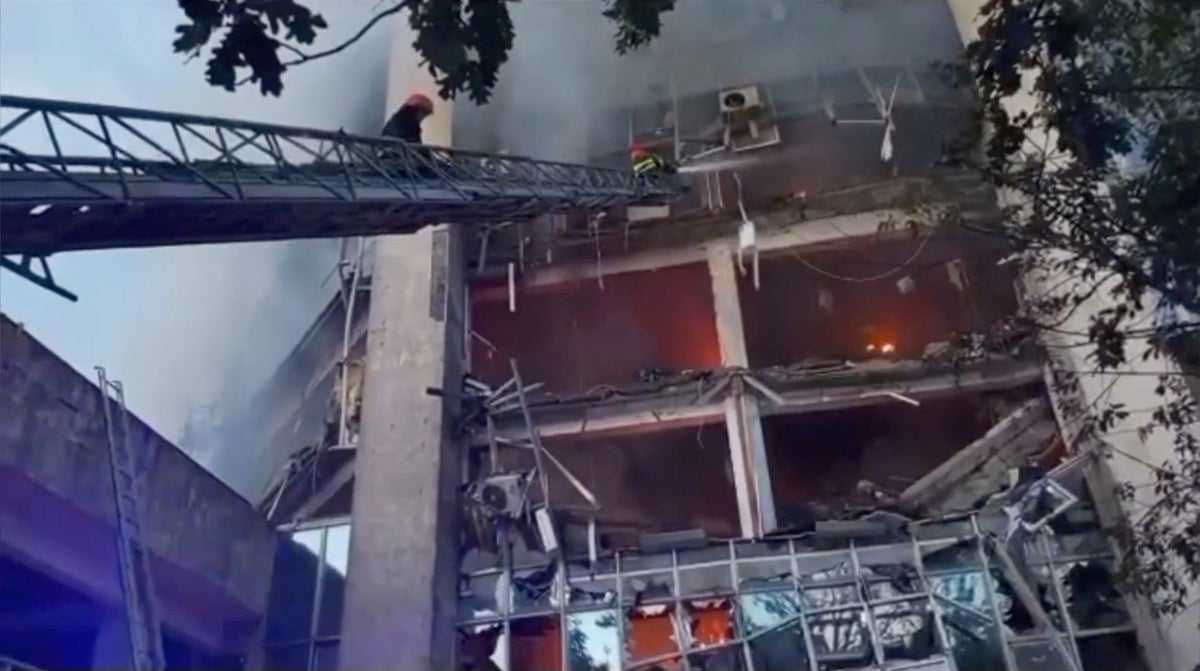
Russia attacked Ukraine’s main inland port across the River Danube from Romania on Wednesday, sending global food prices higher as it ramps up its use of force to prevent Kyiv from exporting grain.
The attacks destroyed buildings in the port of Izmail, south of Moldova, and halted ships in their tracks as they prepared to arrive there to load up with Ukrainian grain in defiance of a de-facto Black Sea blockade reimposed by Russia last month.
The port, which lies across the river from Nato-member Romania, is the main alternative route for exports.
Ukraine said the Russian attacks damaged almost 40,000 tons of grain destined for countries in Africa as well as China and Israel.
“Russian terrorists have once again attacked ports, grain, global food security,” President Volodymyr Zelensky wrote on Telegram.
Russian state news agency RIA claimed the port was housing foreign mercenaries and military hardware.
Video released by the Ukrainian authorities showed firefighters on ladders battling a blaze several storeys high in a building covered with broken windows. Several other large buildings were in ruins, and grain spilled out of at least two wrecked silos.
Izmail port lies at the far south of Ukraine, opposite Romania— (Google Maps)
There were no reports of casualties, according to the Odesa region’s governor, Oleh Kiper.
Commercial ship tracking data showed dozens of international ships halting and dropping anchor at the mouth of the Danube, many of them registered to arrive in Izmail from the Black Sea.
Two industry sources told Reuters that operations at the port were suspended. Seaport authority head Yuriy Lytvyn said on Facebook that repair work had already begun and the port infrastructure continued to operate.
Ukraine is one of the world’s top grain exporters. Russia has attacked its agricultural and port infrastructure for more than two weeks, since refusing to extend an agreement that had lifted its war-time blockade of Ukrainian ports last year.
Meanwhile, Vladimir Putin spoke by telephone to Turkish president Tayyip Erdogan, who sponsored the original grain deal.
The Kremlin said Mr Putin reiterated Russia’s condition for rejoining the deal: that a parallel deal improving terms for its own food and fertiliser exports be implemented.
Mr Erdogan’s office said the leaders agreed Mr Putin would soon visit Turkey. Mr Putin, wanted by the International Criminal Court for war crimes, has made no official visits abroad this year, and has left former Soviet territory only once since launching his invasion, a day trip to Tehran more than a year ago. Mr Erdogan has long said he hopes to host Putin and convince him to rejoin the grain deal.
The United Nations has warned of a potential food crisis in the world’s poorest countries due to Russia’s decision to abandon the deal.
Moscow says it will treat ships heading to Ukraine’s Black Sea ports as potential military targets.
An inspector surveys the damage at a grain port facility in, Izmail, southern Ukraine— (via REUTERS)
Meanwhile, eastern members of Nato are growing worried about the presence of Russia-linked Wagner group mercenaries in Belarus, where some have been deployed since a short-lived mutiny in Russia in June.
Poland, Lithuania and Latvia had already been on alert since large numbers of migrants and refugees began arriving at their borders from Belarus two years ago. They have accused Belarus leader Alexander Lukashenko, an ally of Russia, of opening the migration route in an act of “hybrid warfare” aimed at creating instability in the West.
Now concerns have grown further since the Wagner troops began arriving in Belarus after their mutiny.
Poland’s prime minister, Mateusz Morawiecki, said on the weekend that some 100 Wagner fighters had approached the border with Poland, specifically a strategically sensitive area known as the Suwalki Gap.
“Now the situation becomes even more dangerous,” Mr Morawiecki told reporters. “This is certainly a step towards a further hybrid attack on Polish territory.”
It comes after two Belarusian helicopters entered Polish air space at low altitude while carrying out exercises.
Reuters and Associated Press contributed to this report







